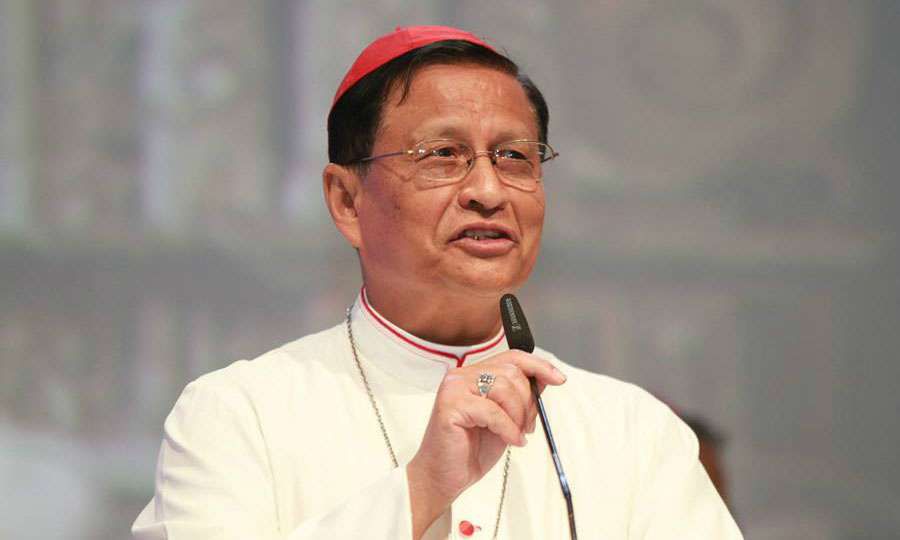Pope Francis’ trip to Burma will help heal the wounds of his country, especially for minorities under attack, the nation's sole cardinal maintains.
Cardinal Charles Maung Bo of Yangon is the first Burmese cardinal in the history of the Church. He was made a cardinal by Pope Francis in 2015.
Speaking with CNA about the upcoming papal trip to the country, Cardinal Bo stressed that the “Vatican and others need to work toward healing the wounds of our nation, by showing a future that can bring positive results for all communities.”
Burma, also known as Myanmar, has garnered increased international attention in recent years because of an escalating persecution of the Rohingya, a predominantly Muslim ethnic group within the Buddhist majority state.
Pope Francis has made a number of appeals for the protection of the Rohingya, since at least May 2015.
Since late August, the United Nations estimates that 582,000 Rohingya have fled Burma's Rakhine state for Bangladesh.
Cardinal Bo told CNA he “hopes that the Pope will address the burning questions” of Rohingya persecution in a meeting scheduled with the country’s de facto leader Aung San Suu Kyi during the November trip.
He also said that the Pope will likely “encourage good steps”, and said that “as a Church, we want to affirm the intensity of human suffering” experienced by the Rohingya because “this problem has been there for last 60 years, and most intensely since 1982, when an unjust citizenship law passed.”
The cardinal also noted that “there is a new energy let loose by the global Islamophobia. The xenophobic regulations in rich countries against Muslims encourages this. Injustice anywhere is injustice everywhere. Muslims are not suffering only in Burma.”
He explained that recent government persecution of the Rohingya was a response to attacks on police stations by Rohingya militant groups. “Yet,” he said, “nothing can justify what happened afterwards.”
Cardinal Bo also addressed controversy surrounding Aung San Suu Kyi, a Nobel Peace Prize winner, and Burma’s State Councillor, the nation’s head of government. A longtime human rights activist, she has been criticized for failure to recognize or stop military atrocities against the Rohingya, and for assigning blame to both sides of the conflict.
The cardinal said that “Aung San Suu Kyi could have done better, but to stigmatize her as if she did nothing is a far fetched theory.”
The cardinal recalled that Aung San Suu Kyi formed the Kofi Annan Commission, an advisory commission on the Rakhine State chaired by the former UN General Secretary Kofi Annan and composed by six Burmese and three international members.
The commission issued a final report in August, requesting that Burma's 1982 citizenship law that classifies Rohingya as illegal immigrants be reviewed. As a short term recommendation, the commission requested that Burma clarify the rights of people who are not granted full citizenship, including the Rohingya.
Cardinal Bo noted that Aung San Suu Kyi “agreed to implement the recommendations” of the Annan Commission.
Cardinal Bo noted that, unfortunately “the very day the Commission report was released, there was a militant attack and the reprisal started.” This, he explained, prevented implementation of recommendations.
But, he said, “by attacking Aung San Suu Kyi, nobody wins. She is still a hope for democracy.”
Cardinal Bo underscored that “Burma is one of the poorest countries in the world, and Rakhine State is the poorest: 70 percent of its people live in extreme poverty.”
In the end, Myanmar “has so many resources, but these do not go to the poor. The Pope is a great prophet of economic justice and environmental justice. He should raise his voice against these two injustices.”
The Archbishop of Yangon also emphasized that the Pope needs to “shed light on other unresolved conflict and displacements.”
The cardinal mentioned the situations in the states of Karen, Kachin, and Shan. Anti-Christian persecutions in Myanmar were highlighted in a 2016 report of the United States Commission on International Religious Freedom.
The report said that in three Burmeses states, Christians are subjected to forced relocation, attacks on their places of worship, and an ongoing campaign of forced conversion and brainwashing in schools funded by the government.
According to the 2016 Report on Religious Freedom by Aid to the Church in Need, minorities are often targeted in Burma in a sort of continuous conflict that takes place in ethnic states.
The report refers in particular to Kachin, where at least 66 churches have been destroyed in ethnic conflicts ongoing since 2011.
The report also underscored that “in the prevalent Christian states of Chin and Kachin, the Burmese army has promoted a policy that forces Christians to remove crosses from the hills and the top of the mountains, sometimes forcing them to build Buddhist pagodas to replace them.”
This practice, the Report stressed, has “diminished since 2012, but never ceased.” In the state of Chin, a Christian was jailed for the crime of building a cross.
Cardinal Bo stressed that the “Rohingya situation is a great tragedy,” but added that “the country needs healing on various fronts.”
“The Holy Father,” he concluded, “has stood against the winds of criticism and mourned the suffering of Muslims and Rohingyas. With unflinching courage we need to stand against global Islamophobia. What happens here is a spill-over and to see this tragedy detached from other human tragedies would be a fragmented truth.”

